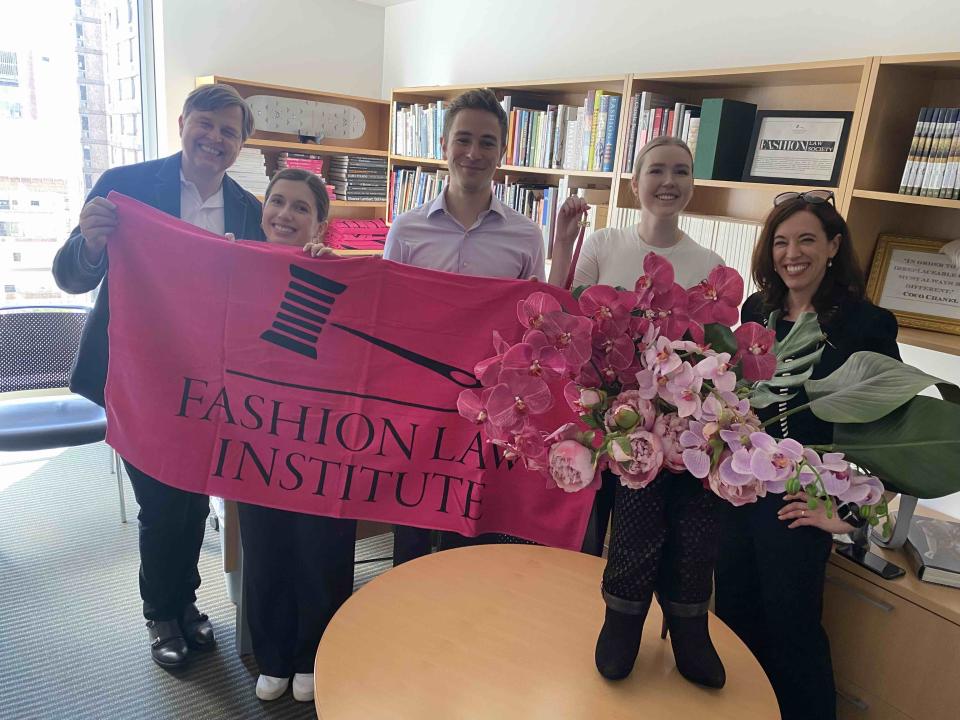Fashion Law Institute Welcomes 14th Cohort
- Oops!Something went wrong.Please try again later.

Susan Scafidi fought tooth and nail to create a fashion law program at Fordham University School of Law.
“Why is it that fashion gets so little protection and other fields get so much?” Scafidi said of “a trillion-dollar industry that “touches all of us every day.”
More from Sourcing Journal
'Malice' and 'Vulgarity': Why Patagonia and Trader Joe's Sued This Mystery T-shirt Maker
Brand Popularized on 'Scandal' Sues Tod's Over 'Confusingly Similar' Logo
Scafidi was a junior professor at another university when she was invited to teach a Fordham course on intellectual property. The job description said she could create a new “seminar of the professor’s choosing,” the only motivation she needed to bring the New York school’s fashion law program to life.
She still had to convince the dean “of every point at which the law touches the life of a garment, from the designer’s dream to the consumer’s closet,” Scafidi told Sourcing Journal. “I broke down the IP, the business and finance and employment and real estate, international trade, government regulation, safety and sustainability and finally, civil rights and consumer culture.”
Fordham gave Scafidi the go-ahead as long as at least three students enrolled in the fashion-focused program. The inaugural seminar launched in 2006 at twice its capacity of 20 and the Fashion Law Institute (FLI) was cleared for takeoff.
“It was never meant to be a course, it was meant to be an entire field of study,” Scafidi said.
In 2010, the institute got its own office space within the Fordham Law building in Midtown Manhattan and graduated its first class. The 14th cohort participates this month in what’s still the only full-fledged program of its kind in the U.S.
“There’s a few courses at other schools, which is great, because when you create a field, you want it to spread, but there’s not really any other [programs at other schools],” Scafidi said. “We’ve worked with attorneys and academics other places around the world and we’ve helped build fashion law into an international movement.”
Scafidi began the fashion law boot camp in 2011 to accommodate the overflow of law students wanting to enroll in her new fashion law program.
“We founded the institute and it got a lot of attention immediately,” said Scafidi. “So we created the boot camp as a summer intensive that mirrors the basic course.”
The 14th edition of the boot camp on May 30-June 3 is open to practicing attorneys, law students and undergraduates.

Earlier this month, the program held its 13th FLI Symposium, focused on trends in fashion law spanning IP to global trade, government regulation, dress code laws and artificial intelligence.
“We have a lot of public programming where we bring in speakers on current hot topics—we have attorneys, students, industry folks, and we talk about it,” Scafidi said. “I don’t like formal symposia where people come in and read pre-read papers… This is more about people who are knowledgeable in the industry about an area introducing topics and then having discussion.”
Graduating seniors Spencer Mooney and Jordan Phelan plan to join law firms when they graduate, but both would entertain the notion of becoming a fashion brand’s in-house counsel.
“It’s a really interesting way to blend my legal interests and also just passion for artistic creative project,” said Mooney, who also works as a paralegal in a firm specializing in trademark copyright law and previously interned at Christie’s Auction House. “I’ve had a lot of really valuable experiences, both through the Fashion Law Institute and from the coursework.”
“There’s so many different fashion law courses you just don’t find anywhere else, so that was a big draw for me,” added Phelan, who is also interning with Louis Vuitton to get a sense of what in-house fashion legal work entails. “The opportunity to be involved in the clinic was definitely something that I was looking for. We interact with so many different clients and get great experience through it.”
Intellectual property establishes the baseline of interest in fashion law, but the FLI has expanded to labor law, especially for models, as well as social issues such as greenwashing.
In 2012, Scafidi and fellow FLI professor Doreen Small joined the Model Alliance, seeking to protect the rights of models and both advanced a New York law that would ensure models under the age of 18 would get the same protections. In 2018, they were named to the board of the Humans for Fashion Foundation, which aims to fight sexual harassment and abuse in the fashion industry.

